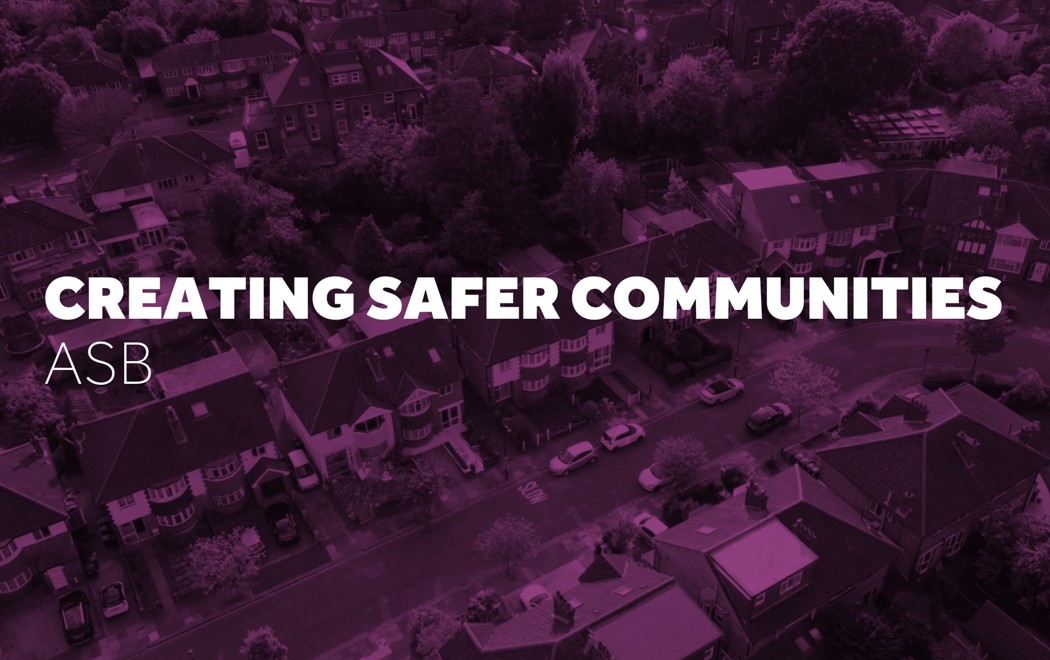The quickest and easiest way to report anti social behaviour is using our online service. There are a number of other ways to get in touch.
If the incident is serious or life-threatening, please call 999 immediately and speak to the emergency services.
What happens when you report ASB?
When you report an incident of ASB we'll ask you about the problems you’re having and will assess the risk to you by completing a short risk questionnaire.
We'll pass your report to either the Housing Management or ASB Team, depending on what is being reported. They’re trained to help and find a way forward.
They’ll then create an action plan with you and tell you who’ll be dealing with your case.
It’s very important you follow these actions as they help us take the case further. If you don’t we’ll be unable to progress the matter and may have to close the case.
They may ask you to keep a record of the ASB issues you’re having. You can do this by completing our ASB incident diary sheets or we may ask you to use the noise app.
When reporting anti-social behaviour, we need as much information as possible. More information can be found in our ASB policy. We also have more information about the types of ASB.
If the incident is serious or life-threatening, please call 999 immediately and speak to the emergency services.
If the incident involves a crime not requiring an emergency response, please call 101. For example if:
- Your car has been stolen
- Your property has been damaged
- You suspect drug use or dealing in your neighbourhood
Alternatively:
- Give the police information about crime in your area
If you’re experiencing anti-social behaviour it can be a tough time and we understand that.
Your case officer will stay in regular contact with you and there's also options for extra support from a range of local services in your area.
This can include
- Victim Support – a national charity that supports people affected by crime or traumatic events.
- Local mental health services – if you need some extra support due to mental health issues.
- Local substance abuse services – if your experience of anti-social behaviour is being made worse due to substance abuse issues.
- Other internal teams.
We will always talk to you about your support needs and never speak to a third party about your case without your permission.
We attempt to resolve all ASB complaints quickly and will work with partner agencies where appropriate. More information can be found in our ASB policy.
If you’ve reported ASB to us and feel the action we’ve taken isn’t helping to tackle the problem, then there are a number of things you can do:
- 1) Make a complaint to us
You can progress a complaint through Southern Housing’s complaints procedure.
If you make a formal complaint a Southern Housing manager will investigate and respond to it.
You can also escalate your complaint if you’re still dissatisfied after we respond. - 2) Make a complaint through your local authority (LA): a ‘Community trigger’
The ASB, Crime and Policing Act 2014 brought in measures to give victims and communities more say in the way their ASB reports are dealt with.
This includes the Community Trigger (also known as the ASB case review). It gives victims the right to request a multi-agency case review where a local authority’s threshold is met.
If you meet your local authority’s threshold for a community trigger (usually 3 separate ASB reports in a 6 month period), they’ll arrange a meeting with you and the key agencies dealing with the ASB to review the case.
At this meeting an independent panel will listen to your concerns. They’ll also hear what the different agencies involved have done to tackle the ASB. The panel then make recommendations on further action to improve things for you.
Community triggers are taken very seriously and all agencies involved are fully expected to act on any recommendations they receive.
What’s the difference between them?
You can make a formal complaint to Southern Housing if there’s been one service failure. A community trigger usually requires you to report 3 separate incidents first.
Our formal complaints are investigated and dealt with by Southern Housing colleagues. A community trigger is co-ordinated by your local authority and involves an independent panel reviewing the case.
A complaint will only consider Southern Housing’s actions whereas a community trigger will consider the actions of all key agencies dealing with the ASB
Which one should I use?
Our complaints process and the community trigger are independent of each other. Each has its own conditions to be used.
You’re not required to make a formal complaint before applying for a community trigger. However if you’re not satisfied with our response we’d appreciate the opportunity to resolve this through our complaints process first.
Read more about making a complaintSpeaking to your neighbour
If it's safe to do so, you may want to try talking to your neighbour in the first instance. Below are some tips from the Housing Ombudsman:
- Think about the issue and ask yourself 'am I being reasonable?'
- Make sure it's safe to approach your neighbour
- Take the time to say hello to your neighbour, or invite them to have a chat over a coffee or a tea
- Choose a time to chat that's convenient for everyone - avoid meal times, early in the morning or late at night
- If you're on good terms with your neighbour, and there's a noise issue, try inviting them into your house to listen to it - they may not know it's a problem
- If there is a noise issue, ask yourself whether it's a 'everyday living noise' that cannot be avoided
- Understand that your neighbour may have a different lifestyle to yours
- Don't leave the problem for too long as it may get worse and it may be harder to come to an agreement
- Do not start shouting at or threatening your neighbour
- Be prepared to listen to what your neighbour has to say and try to come to an agreement that is best for both of you
- If you're unable to speak to your neighbour, try writing a letter and keep a copy as evidence if the problem persists or becomes worse.
If an issue isn't considered ASB
For issues that aren’t considered ASB, we’ve introduced our Good Neighbourhood Management Procedure, a way of working collaboratively with residents before issues escalate.
Some issues may not be deemed ASB, but if left unchecked, they could get worse. Our goal is to step in early and help residents find solutions, because nuisance isn’t always intentional, and a little understanding goes a long way.
Unlike formal ASB management, this is a collaborative process. We work with everyone involved - if they’re willing - to find a way forward that benefits all. We listen, support, and guide conversations between neighbours to reach resolution. It’s not about blame; it’s about improving relationships and building stronger communities.
The Good Neighbourhood Management approach is designed to help with everyday issues like:
• Unintentional noise between properties
• Disputes about use of shared spaces such as communal gardens
• Dogs barking
• Children playing
• Noise from DIY
• Car parking disputes
• Lifestyle differences.
Asking you both to sign up to a Good Neighbour Agreement (GNA)
A GNA document sets out how neighbours agree to behave to avoid problems. It can be tailored to your situation - for example, returning bins promptly or letting neighbours know about upcoming parties. Both parties can suggest what to include, and everyone is invited to sign. Signing doesn’t mean admitting guilt; it’s about making improvements.
Mediation
Mediation involves an impartial professional helping neighbours agree on future behaviour. It’s confidential and requires both parties’ consent. Each person shares their views, then works toward practical commitments. Mediation often improves understanding and relationships.
If you report noise to us and we deal with it through this procedure, as well as taking action to improve relations with your neighbour, we’ll also consider a range of simple measures to help improve the noise between you and your neighbour’s homes.
These may include:
• Checking for repairs contributing to the noise (hammering pipes / creaking floorboards /slamming doors)
• Checking all parties have adequate floor coverings in their home
• Installing low-cost measures to reduce the impact of noise e.g. pads on kitchen unit door or restrictors on doors. There are limits to what we can spend. And we’re unable to fund any extensive soundproofing works.
ASB: Key stats
We looked at all our ASB cases from April 2023 to March 2024 to get a better understanding of our service. The data includes home owners and rental.

35% of cases were categorised as 'Verbal abuse/intimidation/harassment' and took an average of 130 days to close.

17% of cases were categorised as 'Noise' and took an average of 176 days to close.

12% of cases were categorised as 'Criminal behaviour' and took an average of 91 days to close.

12% of cases were categorised as 'Physical violence' and took an average of 102 days to close.

All of the new ASB cases in 23/24 came from approximately 2% of our residents.

Our performance
We believe in being open and transparent about how we're doing when delivering key services to our residents. That's why we report on the number of reported ASB cases each quarter.
Find out about our quarterly performance and also what our residents and homeowners told us about the services we provide when surveyed as part of the Tenant Satisfaction Measures.


